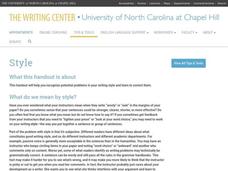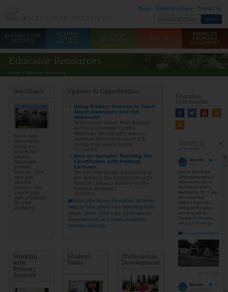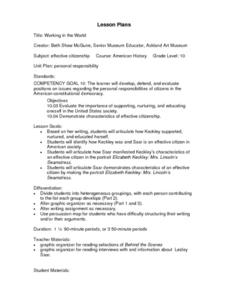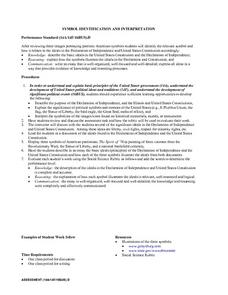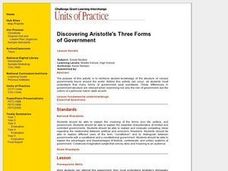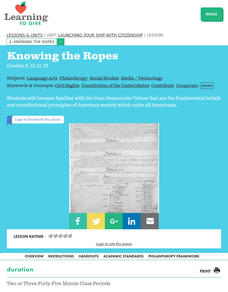Museum of Tolerance
Documents That Shape Society
The Bill of Rights is a foundational document of American democracy, much like the Nuremberg Laws were a foundational document of the Reichstag of Nazi Germany. But that's where their similarities end. Engage high schoolers in a...
University of North Carolina
Style
Just like you choose your clothes to ensure they fit the occasion, you should choose your words deliberately while writing. Style, the main topic of one handout in a series on writing skills, involves choosing words carefully and paying...
Curated OER
What Is Democracy?
Students explore the concept of democracy. They define and describe democracy and choose an issue they believe the government should care about for its people. They write a persuasive essay about their issue.
Curated OER
Diverse Voices - African American Ventures
Students research African American history and the Underground Railroad. In this African American history lesson, students discuss the Drinking Gourd. Students read 'If You Traveled the Underground Railroad' and discuss. Students work in...
Curated OER
Constitutional Issues: Separation of Powers
Young scholars discribe the principle and the history of separation of powers.
Curated OER
Working In The World
Tenth graders engage in research about the life of Keckley. They examine specific events that display the characteristics of good citizenship. The effectiveness of using different tactics by Keckley is discussed in small group to measure...
Curated OER
Inner Workings of Cabinet
Ninth graders explain the relationship of the Cabinet within the Canadian Government structure through video, worksheets and spreadsheets.
Curated OER
Charting the Three Branches of Government
Students review CongressLink on the internet and study the branches of government. They work in groups to create charts showing the structure and functions of the three branches of government as outlined in the first three articles to...
Curated OER
Social Studies: Symbols of the United States
Students research the political traditions of the United States at the national and state levels. After discussing various symbols, students compose essays about the principles expressed in the Declaration of Independence and Constitution.
Curated OER
Discovering Aristotle's Three Forms
Students, working in small groups, role play different kinds of governments--oligarchy, monarchy, dictatorship, and democratic republic. They portray their form of government in a skit, while other groups guess which kind of government...
Curated OER
Pre-reading for Julius Caesar
Students examine friendship and leadership by creating "friendship committees" to develop a class friendship constitution. Committees list qualities/traits of a friend, as well as friendship infractions. These committees join together...
Curated OER
Limits of Power
Learners examine the importance of limiting power in governments. In this government lesson, students investigate the importance of placing limits on government by looking at the US Constitution. They look at ways that being an active...
Curated OER
We Are a Comm-un-it-y. I've Got All My Classmates with Me-Part I
Students investigate the meaning of community. In this community lesson, students look at the concepts of civic engagement, civic responsibility, and common good. They determine how a classroom is a community and the need for having...
Curated OER
Knowing the Ropes
Pupils become familiar with the Core Democratic Values that are the fundamental beliefs and constitutional principles of American society which unite all Americans. Each student is responsible for finding three pictures in magazines that...
Curated OER
Basic Workplace Rights
Young scholars study basic workplace rights and the limits of those rights. They determine how many of the rights guaranteed in the Constitution only regulate governmental actions, not private actions. They examine the concept of at-will...
Curated OER
Sitting Bull: Chief of the Lakota Nation
Young scholars view the "Sitting Bull" video, complete vocabulary work, and discuss the video as a class.
Curated OER
The Origins of American Government
Students create an advertising campaign to persuade the Founding Fathers to adopt a particular political philosophy. Working in groups, they conduct research about a certain political philosophy. Students create a pitch to be made to...
Curated OER
Creating a Government of the People
Students research Penn's model for the government of Pennsylvania. Through assessment of this framework, students create a class constitution and working government.
Curated OER
Citizen Me
Fifth graders examine what it means to be a citizen. Using the Constitution, they discover the functions and purpose of government. They compare and contrast the difference between a democracy and a monarchy. As a class, they discuss...
Curated OER
Passin A bill In The Senate
Learners examine the passage of a bill in the Senate with particular attention to amending bills in Australia. They recognise the potential for minor parties and Independents to hold the balance of power in the Senate. They identify...
Curated OER
Fighting for Democracy, Fighting for Me
Students explore what it means to be American. In this American identity instructional activity, students consider the contributions of Americans throughout history that have protected the promises of the U.S. Constitution.
Curated OER
I'm Tellin'!: Kids Bringing Folktales Alive
Students participate in a reading lesson plan that works on social and academic skills. They increase reading comprehension with direct instruction with the group reading of a folktale. Then students research their own stories to tell.
Curated OER
Japanese Internment
Eleventh graders read about and discuss the Japanese Internment of World War II. In this Japanese Internment lesson, 11th graders examine the Japanese Internment. They talk about the civil rights aspect, how they would deal with being...
Curated OER
Abraham Lincoln's Position on the Question of Slavery and Its Extension
Students read excerpts from Abraham Lincoln's speeches and letters between 1854 and 1861 and look for information relative to Lincoln's thoughts on the legal and Constitutional aspects of slavery.



